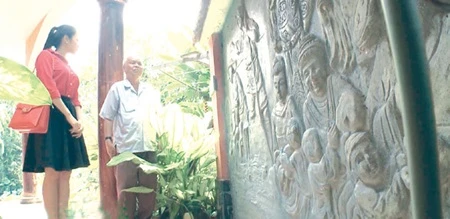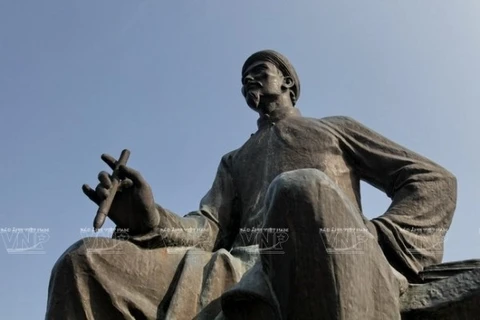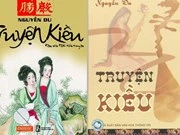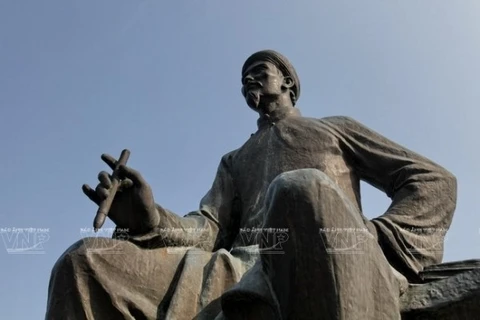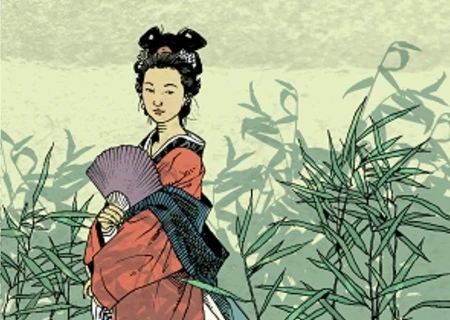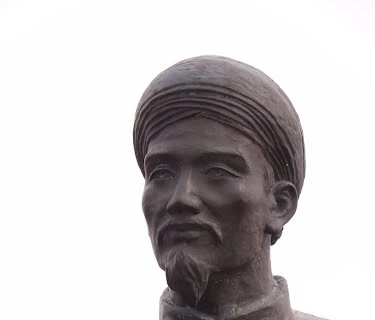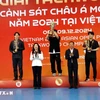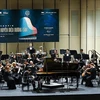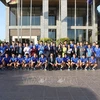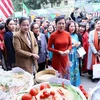Hanoi (VNA) - Amid increasingly deep integration into the world, “Truyen Kieu” (The Tale of Kieu) – a literary legacy left by the great poet Nguyen Du – has transcended national borders to conquer the heart of poetry lovers on all continents.
In the late 19th century, from 1884 to 1885, the Tale of Kieu was translated into French by Abel des Michel and has been available in most popular languages, reaching the hands of readers in almost all major cultures worldwide. Generations of Vietnamese researchers, scholars and poets have worked hard to overcome the twists and turns of the Vietnamese language and convey the meaning of the epic imbued with Oriental spirit and humane value into other languages.
Preliminary statistics show that there are nearly 40 editions of the poem translated into over 20 different languages, including French, English, Japanese, Chinese, Russia, Korean, Hungarian, Polish, Czech, Finnish, Arabic, German, Bulgarian, Romanian, Spanish, Mongolian, Lao and Thai. A series of studies on the philosophy and prosody of Kieu have also been published.
In the US, France and Russia, which have had special links with Vietnam throughout history, the story has many translations and studies, with 13 translated versions in French alone.
The poem’s popularity in France is evidenced by its presence in the Dictionary of Works of All Time and All Countries published by the Society of Editing Dictionaries and Encyclopedias in Paris in 1953.
Notably, Kieu was also translated by French poets, not only by Vietnamese scholars and nationals overseas. French poet Rene Crayssac was one of them, and the work inspired him to write an emotional poem “Kim and Kieu”. He commented that the Tale of Kieu is comparable to any masterpiece of any country and era.
In the US, the translation and study of the epic has been popular even before US President Bill Clinton recited Kieu during his visit to Vietnam in November 2000 and Vice President Joe Biden did the same in July 2015. In 1973, Vietnamese American Professor Huynh Sang Thong, a lecturer at Yale University, translated Kieu into English, not to mention other editions by Le Xuan Thuy, Le Cao Phan and Michael Counsell. At California University, Prof. Mariam made a collection of in-depth, specialised research on the poem.
The epic was also the theme for many Russian researchers, including N. Niculin, Tcachiov and Steinberg.
In Germany, married couple Irene and Franz Faber spent more than seven years translating the French version of the poem and debuted the German version in 1963.
During World War II, Japanese translator Komatsu Kiyoshi compared the epic with Genji Monogatari – a masterpiece of Japanese literature, saying that this is a soulful poem filled with spiritual and cultural values of Annamese people (the name used for Vietnamese people prior to 1945).
In the Republic of Korea (RoK), the Xuan Huong story (referring to a beautiful woman who still keeps her dignity despite the trauma of life) is likened to Kieu. While in China, Kieu is called the best literary work of Vietnam and Nguyen Du is heralded as an outstanding poet.
According to Bountheng Souksavatd from the Lao National Science Institute, “Đoan truong tan thanh” (A New Cry from a Broken Heart), the previous name of the tale, is always in the heart of every Vietnamese in Laos, be they youth or the elderly.
Nguyen Du is the first Vietnamese poet to become so entrenched in the history of humanity, with his Tale of Kieu becoming the first Vietnamese piece to be so widely read across the world. The number of lovers and voluntary researchers of the masterpiece has never been so high.
In 1965, the name Nguyen Du went global and the World Peace Council advocated for celebrations of his 200th birth anniversary, together with eight other world cultural celebrities, including Dante (Italy) and Lomonosov (Russia).
Under the UNESCO General Assembly’s resolution, the national and global-scale celebrations for Nguyen Du’s 250th birth anniversary will be a chance to spread his name and the immortal value of The Tale of Kieu far and wide.
By: Cong Tuyen-Minh Hang-Phuong Chung


